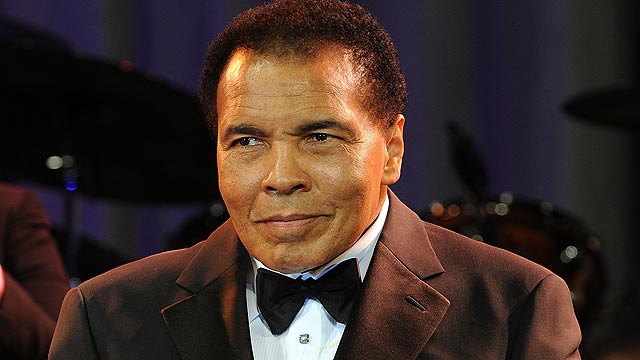
"He who is not courageous enough to take risks will accomplish nothing in life." -- Muhammad Ali
I must admit, I was shocked when I heard the news. I mean, not shocked in a ways that I knew Ali was going to die one day and that his health was ailing, but shocked in another kind of way. I was shocked that another person so good and so strong in the Black Community has died...again. Just a little over a month after the loss of Prince, who was great friends with Ali, 'The Greatest' has died. But not without leaving an unmistakeable imprint on the world.
Ali took risks, pushed people to think beyond themselves, and even in his last breaths, he fought for others and what he believed was right.
"After a 32-year battle with Parkinson's disease, Muhammad Ali has passed away at the age of 74. The three-time World Heavyweight Champion boxer died this evening," Bob Gunnell, a family spokesman said. A funeral service is planned in his hometown of Louisville, Kentucky.
MUST READ: A Lesson From Muhammad Ali's Caregiver And Wife
Ali had suffered for three decades from Parkinson's, a progressive neurological condition that slowly robbed him of his movement and quick verbal jabs.
Born Cassius Marcellus Clay on Jan. 17, 1942 in Louisville, Kentucky, to middle-class parents, Ali started boxing when he was 12, winning Golden Gloves titles before heading to the 1960 Olympics in Rome, where he won a gold medal as a light heavyweight.
He turned professional shortly afterward, supported at first by Louisville business owners who guaranteed him an unprecedented 50-50 split in earnings. He had a natural talent for trash-talk and earned him the dismissive nickname "the Louisville Lip," but he was quick to back up his talk with action. He even relocated to Miami to train with the legendary trainer Angelo Dundee and build a case for getting a shot at the heavyweight title.
As his profile rose, Ali acted out against American racism. After he was refused services at a soda fountain counter, he said, he threw his Olympic gold medal into a river.
Ali found guidance from the Nation of Islam. Inspired by Malcolm X, Ali converted to Islam in 1963. But he kept his new faith a secret until he had the coveted heavyweight title.
In the following year, that opportunity came when heavyweight champion Sonny Liston agreed to fight Ali. It was this fight that came up with the famous line, "float like a butterfly, sting like a bee." He beat Liston in the sixth-round before a stunned Miami Beach crowd. In the ring, Ali proclaimed, "I am the greatest! I am the greatest! I'm the king of the world."
Soon after, the new champion renounced his give name of Clay as his "slave name" and said he would be known from then on as Muhammad Ali — bestowed by Nation of Islam founder Elijah Muhammad. He was 22 years old.
Ali successfully defended his title six times, including a rematch with Liston. Then, in 1967, at the height of the Vietnam War, Ali was drafted to serve in the U.S. Army. But he said he wasn't going--and told the world why.

"My conscience won't let me go shoot my brother, or some darker people, some poor, hungry people in the mud, for big powerful America, and shoot them for what?" Ali said in an interview. "They never called me nigger. They never lynched me. They didn't put no dogs on me."
When he refused to step forward when his name was called, the United States government came down on him. He was stripped of his boxing title, convicted of draft evasion and sentenced to five years in prison.
Released on appeal but unable to fight or leave the country, Ali turned to the lecture circuit, speaking on college campuses, where he engaged in heated debates, pointing out the hypocrisy of denying rights to blacks even as they were ordered to fight the country's battles abroad.
"My enemy is the white people, not Vietcongs or Chinese or Japanese," Ali told one white student who challenged his draft avoidance. "You my opposer when I want freedom. You my opposer when I want justice. You my opposer when I want equality. You won't even stand up for me in America for my religious beliefs and you want me to go somewhere and fight but you won't even stand up for me here at home."
Toward the end of his legal saga, Georgia agreed to issue Ali a boxing license, which allowed him to fight...... Jerry Quarry, whom he beat. Six months later, at a sold-out Madison Square Garden, he lost to Joe Frazier in a 15-round duel touted as "the fight of the century." It was Ali's first defeat as a pro.
Then you know the rest--you've seen the footage. The fight, "The Rumble In The Jungle" in Africa against George Foreman became the biggest, most hyped fight of the century again where Ali won. Next up was the "Thrilla In Manilla" against Frazier where Ali won in the 15th round.
Ali eventually retired at the age of 37 after losing a fight in 1978, but then came out of retirement one last time only to lose in 1980.
The following year, Ali was diagnosed with Parkinson's Disease.
"I'm in no pain," he told The New York Times. "A slight slurring of my speech, a little tremor. Nothing critical. If I was in perfect health — if I had won my last two fights — if I had no problem, people would be afraid of me. Now they feel sorry for me. They thought I was Superman. Now they can go, 'He's human, like us. He has problems.'"
Even as his health began to decline, Ali turned more to humanitarian efforts. Speaking, literally all around the world and being an ambassador for human rights of all walks of people.
In 2005, President George W. Bush honored Ali with the Presidential Medal of Freedom, and his hometown of Louisville opened the Muhammad Ali Center, chronicling his life but also as a forum for promoting tolerance and respect.
Divorced three times and the father of nine children — one of whom, Laila, become a boxer — Ali married his last wife, Yolanda "Lonnie" Williams, in 1986; they lived for a long time in Berrien Springs, Michigan, then moved to Arizona.
His daughter Rasheda said early Saturday that the legend was "no longer suffering," describing him as "daddy, my best friend and hero" as well as "the greatest man that ever lived."
Rest well, my brother. Rest In Peace.










